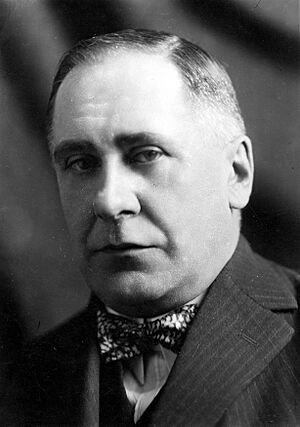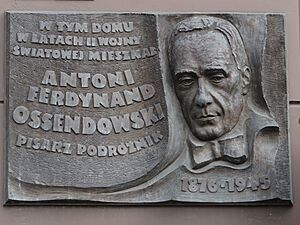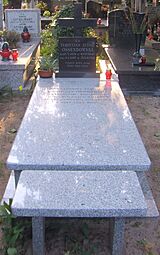Ferdynand Antoni Ossendowski facts for kids
Quick facts for kids
Ferdynand Antoni Ossendowski
|
|
|---|---|

Ossendowski in 1933
|
|
| Born | 27 May 1876 Ludza, Russian Empire (now Latvia) |
| Died | 3 January 1945 (aged 68) Grodzisk Mazowiecki, Poland ) |
| Resting place | Milanówek |
| Occupation | Writer, journalist, traveler |
| Language | Polish |
| Nationality | Polish |
| Notable works | Beasts, Men and Gods Lenin Cień Ponurego Wschodu |
Ferdynand Antoni Ossendowski (born May 27, 1876 – died January 3, 1945) was a famous Polish writer, explorer, and university professor. He was also a political activist who was against communism. He is well-known for his books about Lenin and the Russian Civil War, a big conflict he was part of.
Contents
Early Life and Adventures
Ferdynand Ossendowski was born on May 27, 1876, in a family home near Ludza. This area was then part of the Russian Empire, but it is now in Latvia. His family was Protestant and had roots from the Lipka Tatar people.
He went to a well-known school called a gymnasium in Kamieniec Podolski. Later, he moved with his father, who was a famous doctor, to Saint Petersburg. There, he finished a Russian language school. He then studied chemistry at the local university.
As an assistant to Professor Aleksander Zalewski, he traveled to many far-off places. These included Siberia, the Caucasus mountains, and the Altay Mountains. During the summer, he often worked as a writer on ships traveling between Odessa and Vladivostok. This job let him visit many parts of Asia, like Japan, Sumatra, China, Malaya, and Indonesia. He earned his first money for writing about his trip to Crimea and Constantinople. His book about a trip to India, called A Cloud Over the Ganges, won a special award from the Petersburg Society of Literature.
In 1899, after a student protest in Saint Petersburg, Ossendowski had to leave Imperial Russia. He moved to Paris, France, where he continued his studies at the Sorbonne. His teachers there included Maria Curie-Skłodowska and Marcelin Berthelot. He might have earned a doctorate degree back in Russia, but the documents are missing.
In 1901, he was allowed to return to Russia. Professor Zalewski invited him to teach chemistry and physics at the new Institute of Technology of the Tomsk State University. He also taught at the Agricultural Academy. During this time, he published many scientific papers about water, rocks, chemistry, and physics.
Life in Manchuria and Imprisonment
When the Russo-Japanese War started in 1904, Ossendowski moved to Harbin in Manchuria. There, he started a research lab to help find and develop metal deposits in the area. He also led the local part of the Russian Geographic Society in Vladivostok. This role allowed him to travel a lot to Korea, Sakhalin, and the shores of the Bering Strait.
In Manchuria, he became a leader among the many Polish people living there. He published his first novel in Polish, called Noc (Night). He also joined a group that tried to take power in Manchuria during the Revolution of 1905. After this revolution failed, Ossendowski helped organize a protest against the harsh actions in Congress Poland. Because of this, he was arrested. A military court sentenced him to death for working against the tsar, but his sentence was changed to several years of hard labor.
From Russia to the World

In 1907, Ossendowski was released from prison. However, he received a "wolf ticket", which meant he couldn't easily find a job or leave Russia. So, he focused on writing. His novel V ludskoi pyli (In Human Dust), which described his time in Russian prisons, became very popular in Russia.
His popularity helped him return to St. Petersburg in 1908. He continued to write books and also managed a society for gold and platinum mining. He also ran several newspapers and magazines in both Russian and Polish. When World War I began, Ossendowski published more books. These included a science fiction story, a book about German spies, and a pamphlet describing German and Austro-Hungarian war crimes.
After the February Revolution in 1917, Ossendowski moved again, this time to Omsk in Siberia. He began teaching at the local university there. After the October Revolution and the start of the Russian Civil War, he joined the anti-communist Russian government led by Admiral Aleksandr Kolchak. He worked in different roles, including as an intelligence officer. He also helped transfer many important documents from the old Russian government and anti-communist groups to the Allied forces. These documents included information about German support for Lenin and his Bolsheviks.
After Kolchak's forces were defeated in 1920, Ossendowski joined a group of Poles and anti-communists. They tried to escape from communist-controlled Siberia to India, traveling through Mongolia, China, and Tibet. After a journey of thousands of miles, they reached Chinese-controlled Mongolia. However, they were stopped when a mysterious leader named Baron Roman Ungern von Sternberg took over the country. The Baron was a spiritual person who was very interested in Asian beliefs like Buddhism.
Ossendowski joined the Baron's army as an officer. He also briefly became the Baron's political advisor and head of intelligence. Not much is known about his time in this role, which adds to his mysterious story. In late 1920, he was sent on a diplomatic mission to Japan and then to the United States. He never returned to Mongolia. Some people believe that Ossendowski was one of those who hid the legendary treasures of Baron Roman von Ungern-Sternberg.
When he arrived in New York City, Ossendowski began working for the Polish diplomatic service. He might have also worked as a spy. In late 1921, he published his first book in English, Beasts, Men and Gods. This book described his travels during the Russian Civil War and the campaigns led by the "Bloody Baron." It became a huge success and a bestseller. In 1923, it was translated into Polish and then into many other languages.
Return to Poland and Literary Success
In 1922, Ossendowski returned to Poland and settled in Warsaw. Right away, he started giving lectures at several schools, including the Wolna Wszechnica Polska, the Higher War School, and the School of Political Sciences at the Warsaw University. He also continued to advise the Polish government as an expert on the Soviet Union.
He kept traveling to different parts of the world, and after each trip, he published one or two books. Between World War I and World War II, he was known for creating a new type of book called the traveling novel. He published over 70 books in Poland, and they were translated almost 150 times into 20 other languages. This made Ossendowski the second most popular Polish author abroad, after Henryk Sienkiewicz.
He repeated the success of Beasts, Men and Gods with a book about Lenin. In this book, he openly criticized the Soviet communist ways and leaders. In Poland, three of his books were being made into movies when World War II began.
World War II and Final Years
After the German invasion of Poland in 1939 and the start of World War II, Ossendowski stayed in Warsaw. In 1942, he changed his religion from Lutheran to Catholicism. The next year, he joined the secret National Party that was working underground against the occupation. He helped with secret education programs and plans for learning after the war.
After the Warsaw Uprising, Ossendowski, who was very ill, moved to a village called Żółwin, near Milanówek. On January 2, 1945, he was taken to a hospital in Grodzisk Mazowiecki. He died there on January 3, 1945, and was buried the next day in the Milanówek cemetery.
After His Death
Just two weeks after Ossendowski's death, on January 18, the area was taken over by the Red Army. It turned out that Ossendowski was wanted by the NKVD, the Soviet secret police. They considered him an "enemy of the people" because of his book about Lenin and the Soviet system, which they saw as anti-Soviet. Soviet agents even dug up his body to confirm he was really dead.
After the war, the new communist government in Poland, which was supported by the Soviet Union, banned all of Ossendowski's books. Many of his books were taken from libraries and burned. It wasn't until 1989 that his books were allowed to be published openly in Poland again.
See also
- Sławomir Rawicz
- Tiziano Terzani
- Roman von Ungern-Sternberg
- Polish-Mongolian literary relations
Images for kids
 | Percy Lavon Julian |
 | Katherine Johnson |
 | George Washington Carver |
 | Annie Easley |



